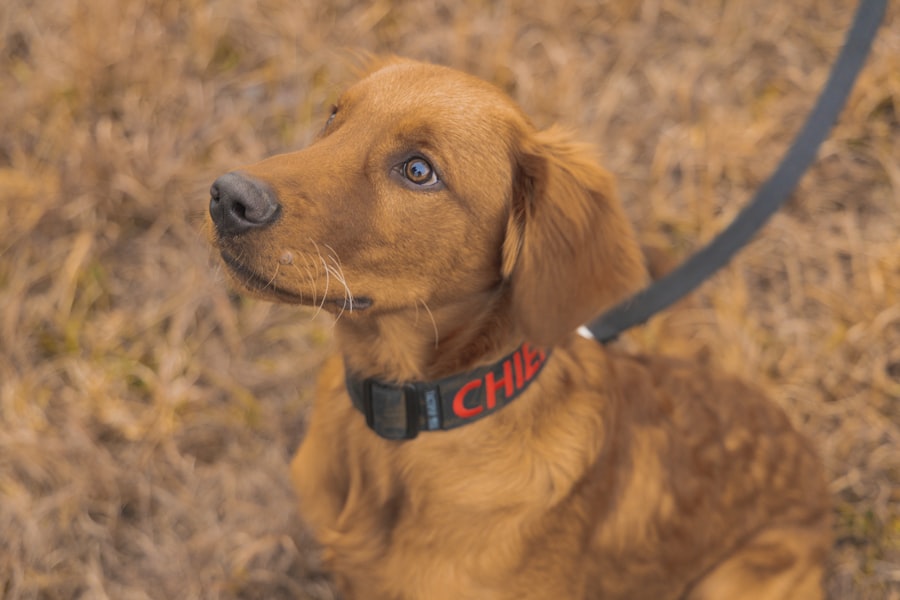The Nova Scotia Duck Tolling Retriever, also known as the Toller, is a medium-sized breed of dog that originated in the Little River District of Nova Scotia, Canada. They were originally bred to lure and retrieve waterfowl, hence the name “tolling,” which refers to the dog’s playful and energetic movements that attract the attention of ducks. Tollers are known for their striking red coat, intelligent expression, and agile build. They are highly energetic, intelligent, and affectionate dogs that make excellent companions for active individuals and families.
Tollers are known for their love of water and their exceptional retrieving abilities. They are natural swimmers and excel in various water sports such as dock diving and retrieving games. In addition to their athleticism, Tollers are also known for their intelligence and trainability. They are quick learners and thrive on mental stimulation and physical activity. Tollers are also known for their affectionate and loyal nature, making them great family pets. They are good with children and other pets, although early socialization is important to ensure they develop good manners and behavior. Overall, the Nova Scotia Duck Tolling Retriever is a versatile and loving breed that excels in various activities and makes a wonderful addition to any active household.
Table of Contents
- 1 The Importance of Choosing a Reputable Breeder
- 2 Finding a Nova Scotia Duck Toller Breeder
- 3 Questions to Ask a Breeder
- 4 The Breeding Process
- 5 Health and Care Considerations
- 6 Bringing Your Nova Scotia Duck Toller Home
- 7 FAQs
- 7.1 What is a Nova Scotia Duck Tolling Retriever (NSDTR)?
- 7.2 What should I look for in a reputable Nova Scotia Duck Tolling Retriever breeder?
- 7.3 How can I find a Nova Scotia Duck Tolling Retriever breeder?
- 7.4 What health considerations should I be aware of when getting a Nova Scotia Duck Tolling Retriever?
- 7.5 What is the average lifespan of a Nova Scotia Duck Tolling Retriever?
- 7.6 Are Nova Scotia Duck Tolling Retrievers good family pets?
Key Takeaways
- A Nova Scotia Duck Toller is a medium-sized, intelligent, and energetic breed of dog known for their hunting and retrieving abilities.
- Choosing a reputable breeder is crucial to ensure the health and temperament of your Nova Scotia Duck Toller.
- When finding a Nova Scotia Duck Toller breeder, it’s important to do thorough research, ask for references, and visit the breeder’s facilities.
- When speaking with a breeder, be sure to ask about health clearances, socialization practices, and the breeder’s involvement in the breed community.
- The breeding process for Nova Scotia Duck Tollers involves careful selection of parents, genetic testing, and proper care for the mother and puppies.
The Importance of Choosing a Reputable Breeder
When looking to add a Nova Scotia Duck Tolling Retriever to your family, it is crucial to choose a reputable breeder. A reputable breeder will prioritize the health and well-being of their dogs, as well as the betterment of the breed as a whole. They will conduct health screenings on their breeding dogs to ensure they are free from genetic diseases and will provide proper care and socialization for their puppies. Reputable breeders will also be knowledgeable about the breed standard and will strive to produce puppies that meet these standards in terms of temperament, conformation, and working ability.
Choosing a reputable breeder also ensures that you are getting a puppy from healthy and well-adjusted parents. This can significantly reduce the risk of genetic health issues and behavioral problems in your puppy. Additionally, reputable breeders will be there to support you throughout your Toller’s life, offering guidance, advice, and assistance whenever needed. They will also have a thorough understanding of the breed’s characteristics and will be able to match you with a puppy that suits your lifestyle and needs. Overall, choosing a reputable breeder is essential for ensuring that you bring home a happy, healthy, and well-adjusted Nova Scotia Duck Tolling Retriever.
Finding a Nova Scotia Duck Toller Breeder
Finding a reputable Nova Scotia Duck Tolling Retriever breeder can be a daunting task, but it is crucial to take the time to research and find the right one. One of the best ways to find a reputable breeder is through referrals from other Toller owners, breed clubs, or local dog shows. These sources can provide valuable insights into breeders who prioritize the health and well-being of their dogs and produce high-quality puppies. Additionally, online resources such as breed-specific forums and websites can also be helpful in finding reputable breeders.
When researching breeders, it is important to look for certain red flags that may indicate an irresponsible breeder. These include breeders who have multiple litters available at all times, breeders who do not conduct health screenings on their breeding dogs, and breeders who are not transparent about their breeding practices. It is also important to visit the breeder’s facility in person to see how the dogs are cared for and to meet the breeding dogs and any available puppies. This will give you a good sense of the breeder’s ethics and the environment in which the puppies are raised.
Questions to Ask a Breeder
When contacting a Nova Scotia Duck Tolling Retriever breeder, it is important to ask a series of questions to ensure that they are reputable and responsible. Some important questions to ask include:
– Can you provide references from previous puppy buyers?
– What health screenings do you perform on your breeding dogs?
– Can I meet the parents of the puppies?
– How do you socialize your puppies?
– What is your approach to training and behavior development?
– Do you provide a health guarantee for your puppies?
– What support do you offer to puppy buyers after they bring their Toller home?
These questions will help you gauge the breeder’s commitment to producing healthy, well-adjusted puppies and their dedication to supporting their puppy buyers throughout the lifetime of their Toller.
The Breeding Process
Reputable Nova Scotia Duck Tolling Retriever breeders follow a careful and ethical breeding process to produce healthy and well-adjusted puppies. This process begins with selecting breeding dogs that meet the breed standard in terms of conformation, temperament, and working ability. These dogs will undergo thorough health screenings to ensure they are free from genetic diseases that could be passed on to their offspring.
Once the breeding dogs have been selected, the breeder will carefully plan each breeding to ensure that it aligns with the betterment of the breed. This may involve researching pedigrees, considering genetic diversity, and selecting mates that complement each other in terms of strengths and weaknesses. The actual breeding process is carefully supervised to ensure the health and safety of both the male and female dogs involved.
After the female has been bred, she will undergo prenatal care to ensure she remains healthy throughout her pregnancy. The breeder will provide proper nutrition, veterinary care, and monitoring to ensure the health of both the mother and her developing puppies. Once the puppies are born, they will receive around-the-clock care and socialization to ensure they are well-adjusted and ready for life in their new homes.
Health and Care Considerations

The Nova Scotia Duck Tolling Retriever is generally a healthy breed with a lifespan of 12-14 years. However, like all breeds, Tollers are prone to certain genetic health issues that responsible breeders work hard to minimize through health screenings and selective breeding practices. Some common health concerns in Tollers include hip dysplasia, progressive retinal atrophy (PRA), and autoimmune disorders.
To ensure your Toller remains healthy throughout their life, it is important to provide them with regular veterinary care, proper nutrition, exercise, mental stimulation, and preventive healthcare such as vaccinations and parasite control. Regular exercise is particularly important for Tollers, as they are highly energetic dogs that require plenty of physical activity to keep them happy and healthy.
In addition to physical care, it is important to provide your Toller with mental stimulation to prevent boredom and destructive behaviors. This can include activities such as training sessions, interactive toys, puzzle games, and outdoor adventures. Tollers thrive on having a job to do, so participating in activities such as obedience trials, agility courses, or retrieving games can provide them with both physical exercise and mental stimulation.
Bringing Your Nova Scotia Duck Toller Home
Bringing a Nova Scotia Duck Tolling Retriever home is an exciting time for both you and your new furry friend. It is important to prepare your home for your Toller’s arrival by providing them with a comfortable bed, food and water dishes, toys, grooming supplies, and a secure outdoor area for exercise and play. It is also important to puppy-proof your home by removing any potential hazards such as toxic plants, small objects that could be swallowed, or accessible electrical cords.
When bringing your Toller home, it is important to establish a routine for feeding, potty breaks, exercise, training, and rest. Consistency is key in helping your Toller adjust to their new environment and develop good habits. Positive reinforcement training methods are highly effective with Tollers, as they respond well to praise, treats, and play as rewards for good behavior.
Socialization is also crucial for young Tollers to help them develop into well-adjusted adults. Exposing them to various people, animals, environments, sounds, and experiences from a young age will help them become confident and adaptable companions. It is important to introduce new experiences gradually and positively to prevent fear or anxiety.
In conclusion, bringing home a Nova Scotia Duck Tolling Retriever is an exciting adventure that requires careful consideration in finding a reputable breeder who prioritizes the health and well-being of their dogs. By asking the right questions and conducting thorough research, you can find a breeder who will provide you with a healthy, well-adjusted Toller puppy that will bring joy to your life for years to come. With proper care, training, socialization, and love, your Toller will thrive as an active companion and loyal family member.
If you’re considering adding a Nova Scotia Duck Tolling Retriever to your family, you may also be interested in learning about the importance of providing a suitable environment for your pets. In a recent article on PoultryWizard.com, the author discusses the essential factors to consider when building a chicken coop in Chester, South Carolina. The article provides valuable insights into the size requirements and design considerations for creating a comfortable and safe living space for chickens. Check out the full article here.
FAQs
What is a Nova Scotia Duck Tolling Retriever (NSDTR)?
A Nova Scotia Duck Tolling Retriever, also known as a “Toller,” is a medium-sized sporting dog breed known for its ability to lure and retrieve waterfowl. They are intelligent, energetic, and have a distinctive red coat.
What should I look for in a reputable Nova Scotia Duck Tolling Retriever breeder?
A reputable breeder should prioritize the health and well-being of their dogs, conduct health screenings for genetic conditions, provide proper socialization for the puppies, and be knowledgeable about the breed’s standard and characteristics.
How can I find a Nova Scotia Duck Tolling Retriever breeder?
You can find a reputable breeder by contacting the Nova Scotia Duck Tolling Retriever Club of Canada or the breed’s national kennel club. It’s important to do thorough research and ask for references before purchasing a puppy from a breeder.
What health considerations should I be aware of when getting a Nova Scotia Duck Tolling Retriever?
Nova Scotia Duck Tolling Retrievers are generally healthy dogs, but they can be prone to certain genetic health issues such as hip dysplasia, progressive retinal atrophy, and autoimmune conditions. It’s important to work with a breeder who conducts health screenings and provides health guarantees for their puppies.
What is the average lifespan of a Nova Scotia Duck Tolling Retriever?
The average lifespan of a Nova Scotia Duck Tolling Retriever is 12-14 years.
Are Nova Scotia Duck Tolling Retrievers good family pets?
Yes, Nova Scotia Duck Tolling Retrievers are known for their affectionate and playful nature, making them great family pets. They are also good with children and other pets when properly socialized and trained.
Meet Walter, the feathered-friend fanatic of Florida! Nestled in the sunshine state, Walter struts through life with his feathered companions, clucking his way to happiness. With a coop that’s fancier than a five-star hotel, he’s the Don Juan of the chicken world. When he’s not teaching his hens to do the cha-cha, you’ll find him in a heated debate with his prized rooster, Sir Clucks-a-Lot. Walter’s poultry passion is no yolk; he’s the sunny-side-up guy you never knew you needed in your flock of friends!







